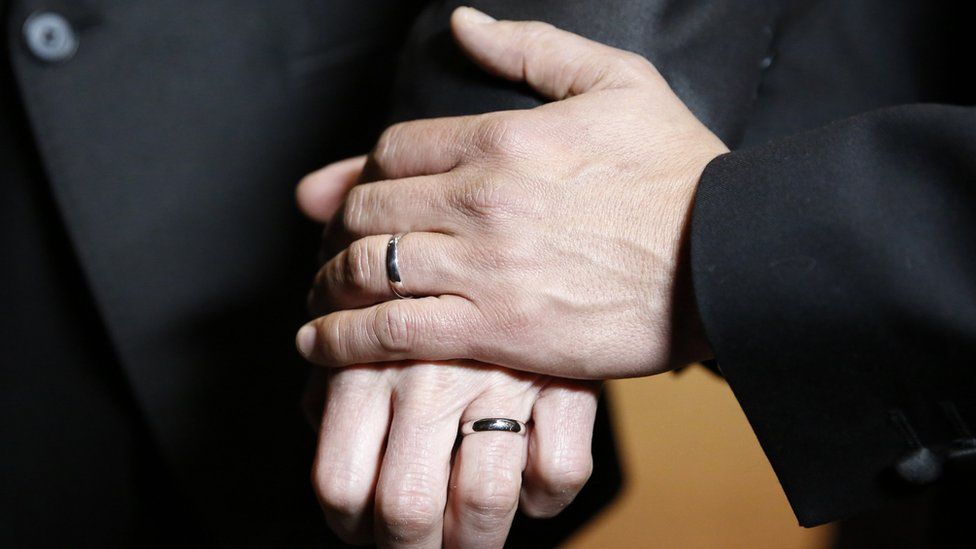
A vote was passed with an amendment for some special services to go ahead sooner than expected
By Harry Farley, religion and ethics producer
BBC News
Gay couples will be able to have special services of blessing in Church of England parishes for the first time.
The services, while not formal weddings, will be able to include the wearing of rings, prayers, confetti and a blessing from the priest.
The amendment to back the services on a trial basis passed the Church’s parliament by one vote.
The Church of England’s official teaching is that marriage is only between one man and one woman.
Earlier this year, bishops refused to back a change in teaching which would have allowed priests to marry same-sex couples, but said they would allow prayers of blessings for people in gay relationships as part of wider services.
It had been thought approval for standalone services might not come for well over a year from now.
But Wednesday’s vote, which passed narrowly in the General Synod, the Church’s legislative body, means distinct services of blessing could now be allowed, rather than simply prayers within a normal church service.
While there is no set timeframe for temporary trial services to begin, it is understood these could be authorised in the comings weeks with the first services in the new year.
The proposal for stand alone services on a trial basis came in an amendment to a motion. The full formal process of authorisation, which will take around two years, will take place while the trial is running.
The Bishop of Oxford, the Rt Rev Stephen Croft, who has campaigned for a change in the Church’s stance, said he was “delighted”.
Noting the services would not be official weddings, he added: “I hope there will be a similar joy and affirmation and those that come to receive these prayers will feel fully welcomed into the life of the church.”
The Church of England’s official position on marriage is at odds with its Anglican equivalent in Scotland – The Scottish Episcopal Church – and the Presbyterian Church of Scotland, which both allow same-sex weddings.
The Anglican Church in Wales has provided an authorised service of blessing for gay couples but does not allow same-sex weddings in church.
Jayne Ozanne, a prominent LGBT campaigner who sits on the Church of England’s General Synod, called for the Church to change its position to allow gay couples to marry.
“The Church of England remains deeply homophobic, whatever bishops and archbishops may say,” she said.
“I fear that much of the nation will judge the Church of England as being abusive, hypocritical and unloving – they are, sadly, correct.”
Meanwhile, conservative clergy described it as a “watershed” moment.
Revd Canon John Dunnett, national director of the Church of England Evangelical Council, said he felt “grieved and saddened” by the decision.
“It will tear local parish congregations apart, damage the relationship between large numbers of clergy and their bishops and cause churches across the dioceses to feel as though their shepherds have abandoned them,” he said.

